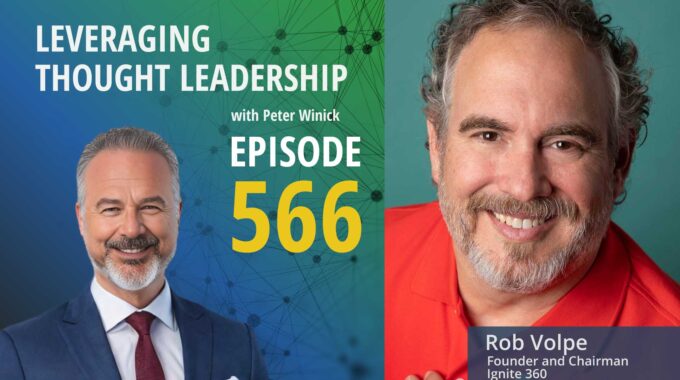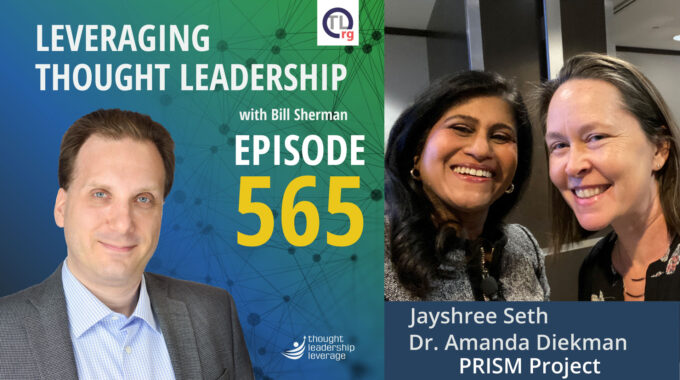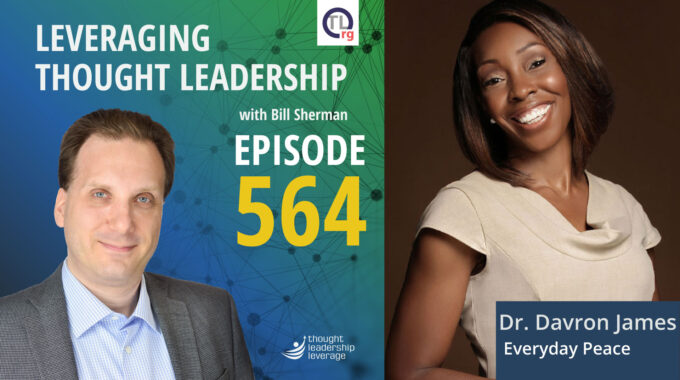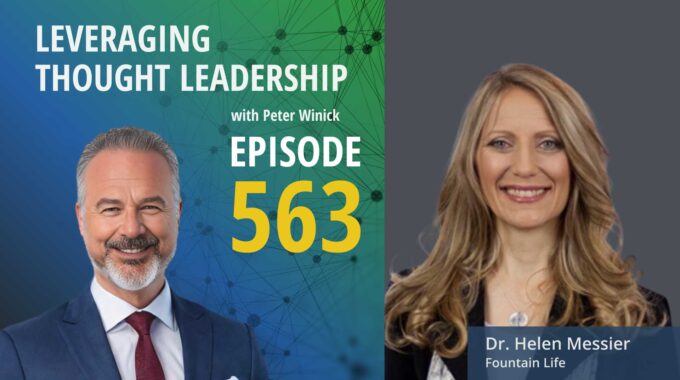Transforming Teams with Compassion and Understanding A conversation with Rob Volpe about the impact empathy…
Increasing Confidence Through Curiosity | Emily Jaenson
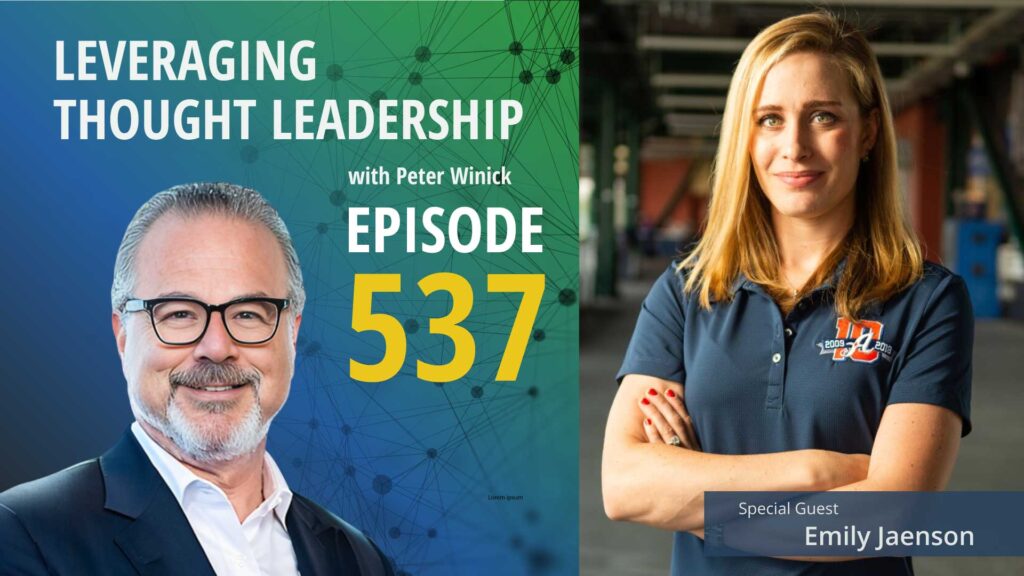
Behaviors you need to practice to increase your confidence.
An interview with Emily Jaenson about going from being too shy to order a pizza to writing a book on confidence.
Most people think thought leaders are naturally confident – but like any other skill, confidence is something you can grow!
Our guest today is Emily Jaenson, keynote speaker, host of the hit podcast Leadership is Female, and co-founder of the Assist Group, a collective of experienced sports professionals ready to step in and provide sales, marketing & leadership consulting.
Emily has an impressive resume in sports and thought leadership, but at one time she was too shy to even order a pizza. She shares her journey leaving her small town to attend university where she realized she needed to level up and that could only be accomplished with confidence! She pushed through one uncomfortable situation after another taking them as opportunities to grow and even take on leadership roles helping others grow.
One way Emily has been able to help others grow is with her TEDx talk “Six behaviors to increase your confidence” which has been viewed more than 3 million times. Emily discusses how the TEDx talk was the culmination of years of knowledge, experience, and interviews from her podcast distilled into an incredibly impactful twelve-minute talk. The talk was so impactful that corporations began to reach out to her to deliver that message to their employees. We learn how she took this opportunity to grow her business, going on the offense creating a website, networking, and developing a pitch to take her content to the world instead of waiting for it to come to her.
Emily gives examples from her career on the behaviors others can practice to get through tough times, expand their comfort zone, and ultimately grow their confidence!
Three Key Takeaways:
- Once you have content out in the world you can’t sit and wait for the clients to come to you. You need to network and take the content to the people who need it most.
- People tend to believe you are born with confidence or you’re not. However, confidence is a skill. It can be taught and learned.
- Confidence is competence. And you gain competence through curiosity.
If you need a strategy to bring your thought leadership to market, Thought Leadership Leverage can assist you! Contact us for more information. In addition, we can help you implement marketing, research, and sales. Let us help you so you can devote yourself to what you do best.

Transcript
Peter Winick And welcome, welcome, welcome. This is Peter Winick. I’m the founder and CEO at Thought Leadership Leverage. And you’re joining us on the podcast, which is leveraging thought leadership today. My guest is Emily Jaenson and I’ll give you a little bit of background on her. She’s got a book out called Let’s Go: A Guide to Increasing Your Confidence. She’s a keynote speaker who is obsessed with goals and helping you achieve yours. She’s a former Triple A GM in Major League Baseball, which is kind of cool and a consultant. Strategic marketing and partnerships with an emphasis in sports, entertainment brand and nonprofit and a podcast host. So instead of talking about her, I’d rather talk with her. So welcome. Thanks, Emily. Thanks for coming on.
Emily Jaenson Thanks for having me, Peter. I really appreciate it.
Peter Winick Yeah. So first thing for you, given that for, I don’t know, like 99.9% of the people I talked to thought leadership is not a linear or long-term plan from, you know, they had the Halloween costume when they were five, that that’s what they wanted to be. How did you get here? How did this happen?
Emily Jaenson Yeah, it’s I’m going to try to make this story as brief and exciting as possible. I grew up in a really small town, 3360 people about 90 minutes north of Chicago. And while I did well in school and did great in sports, I was very shy and very sheltered. But inside of me, there was this idea kind of burning for more. I had no clue how to get there. I was just taking the next right step, oftentimes hiding behind my mom to get there. I couldn’t even call to order a pizza when I was in high school because I was too shy to talk to a stranger. And I went to college at the University of Illinois. And wow, that was an exercise in breaking out of my shell. I would have been way more comfortable just staying home because I went from kind of big fish, small town or big fish, small pond in my hometown to like a minnow in the ocean. And the girls who lived across the hall for me and for 15 Scott Hall were already sophomores because they had so many credits from their AP tests. And I was like, Girl, it’s time to level up. I didn’t really know how to get there, but I knew what I needed to do was to become more confident. And that’s kind of where the principles of adapting these behaviors of confidence can change your attitude. And so slowly but surely, over my career, one uncomfortable situation after another and one growth opportunity after another, I grew and I had some earn some great opportunities in my life and was put into leadership roles. And what I loved the most about that was how I could help other people grow. And that’s really where I thought leadership blossomed as kind of my next career move.
Peter Winick So when people move into the business side of thought leadership, that creates more questions than answers. Right? Because if you say I was studying to be an accountant and now I am an accountant, like you kind of get it, but you could declare that you’re a thought leader. But the business side of that is tricky and not a one size fits all. So how did you how did you come to the current business models that you’re working on?
Emily Jaenson Yeah. Well, I think if I look back on my life, everything happened through performance, through hard work and proving what I could do. And I had an opportunity to do that because I did test acts and I spoke on confidence. And in a year, it had 3 million views and people were reaching out to me from around the world. And that was a very valid moment in my life where I was like, wow, I like I feel like this is this work is all validated because it’s been, you know, 18 years since I was in college. And it’s sort of this culmination of knowledge and experience and interviews from my leadership, female podcast and experience in the workplace that is all distilled down into this 12-minute impactful talk. And with that sort of explosion of, Ooh, I want more. That’s really where it was born, because companies started to reach out to me and say, Hey, can you share this message with our employees? We’re going to pay you. And I was like, oh, my gosh, you’re going to pay me to talk. This is no more free talks to the Chamber of Commerce.
Peter Winick This is a no deal. So you just did it kind of for the love of doing it. And then people came to you because I’ve heard that story as well, where someone said, Oh, would you do this for money? I’m like, Oh, yeah, of course. Like, that’s pretty cool. So once that happened once or twice, how did you sort of flip that and say, Well, it’s probably easier if I go to them than wait for them to come to me in terms of making this a real business?
Emily Jaenson Yeah. And that’s really where it flips from. Wow. This is a cool opportunity to. Oh, I should, I should and could make a business out of this. And for me, all of my career growth was builds out of sales. I. Experienced such a growth in my personal and professional life by being a cell. I was so shy I couldn’t call and order pizza to selling, you know, millions of dollars over my career in tickets and sponsorships and doing that outreach. And so really leaning back on those skills that I had, I was like, You know what? I can get on the offense with this and I should be reaching out on behalf of myself, promoting myself and found the best ways to make a website, you know, what should I do for this? Who should I be reaching out to? To who should I be Googling? Who are these contacts? How should this pitch look? And the great thing about where we are today is like, you’re not opening up an Encyclopedia Britannica to find out how to do something. You can search online and find great information to put together your business. If you have the drive and the willpower and the tenacity and dedication to do it.
Peter Winick Got it. So what’s next then? So you’ve got you know, when I look at it as an outsider, which I am, right. You’ve got the book, you’ve got the speaking, you’ve got whatever. Where do you envision taking this to in a year or 18 months? And you could, you know, sort of answer that in terms of impact or business growth or because they’re not mutually exclusive.
Emily Jaenson Right? Yeah. Well, really with this, for me, it’s been about taking the next right step forward. I’ve started to hire people to help me out When the capacity got to Vegas, time to reinvest back into the company and get the help so I could work on the business rather than just be the taskmaster all the time. And that is crucial. So that’s a huge milestone for me. It’s going to free me up to do more of the work that’s going to earn money for the company, not just keeping it afloat. The second thing is I preach curiosity. I really believe, like you have to stay curious. You have to stay current. You have to keep learning. And I decided to do that in a more formal way. So I’m getting my master’s in positive psychology. Very good steer to kind of back it all up, right? Like, I really believe in the research piece. My book contains so much research because if you’re not going to believe what I say, like, believe what this maybe believe what the study says.
Peter Winick Is there a relationship or a connection between curiosity and confidence?
Emily Jaenson I think so, because confidence is competence, and you gain competence through curiosity. So if you are curious about, hey, you know, I’m not feeling confident about X, whatever that might be like, I’m not sure if I can finish A5K, I’m not sure if I could successfully present to ownership if I can get curious about how to do that thing. Okay. What’s the best way to train for A5K or what’s the best way to make an impactful presentation? If I can research what that is. Practice that skill. Become more competent in that skill. I can be more confident when I do that activity.
Peter Winick Got it.
Peter Winick If you’re enjoying this episode of Leveraging Thought Leadership, please make sure to subscribe. If you’d like to help spread the word about our podcast, please leave a five-star review at ratethispodcast.com/ltl and share it with your friends. We’re available on Apple Podcasts and on all major listening apps as well as at thoughtleadershipleverage.com/podcast.
Peter Winick So I’m just playing that back in my head. So it’s not it’s kind of a once removed relationship, right? So curiosity leads to exploration, leads to educationally, whatever. Now, I’m not just curious, but I know the answer to the Earth is round or whatever it is, and therefore I can speak with confidence. So is the inverse true or people mock because I’ve seen a lot of people that are incredibly knowledgeable about their domain area but still lack confidence. So I guess maybe like what’s the so that there’s a Venn diagram there. Yeah.
Emily Jaenson So Peter, that’s where really the behaviors come into play. So oftentimes we can be incredibly competent about a certain area, but we lack the confidence to go forward with that idea for, for whatever reason that might be. So I really talk about the behaviors that you can practice in order to get through those tough times, to expand your comfort zone into new and bigger areas for yourself. So, you know, maybe not.
Peter Winick Is that not a newer version of fake it to you? Make it or what’s what?
Emily Jaenson I don’t think so. I don’t think it’s fake. It’s how you make it that runs out of juice. And it requires a certain type of confidence to even fake it in the first place. So if we can just kind of will ourselves like think about there’s all this talk about future self, right? So I use a bunch of examples of my previous positions, like I was the general manager of a triple-A baseball team. I was the first woman to do that in 20 years. And in order to like successfully keep and lead in that role, it required a certain kind of behavior. And I didn’t necessarily possess all of that. When I got the job, I had the business acumen to run the business, but I didn’t necessarily have, I don’t know, I guess in the old days would call it like the chops, you know, like it wasn’t like I wasn’t like ready to go in that arena because it was new and foreign to me. But when I thought about like. Who was I? How did I want to perform? How did I want to represent my team on an even more grand scale? How did I want to represent women who got an opportunity to hold this role in this industry? I wasn’t someone who shied away from conflict. I wasn’t someone who, like, hid in her office and pretended that she didn’t see that the teams were dressed incorrectly for the game. I had to go and have those conversations. And in order for me to do that, I needed to become a more confident person. And I did that by practicing behaviors like one of them, as an example that I talk about a lot is counting yourself in. So. A lot of us probably played sports, you know, growing up. I think that’s a that’s a good memory to sort of reference in this regard is we performed by the clock. Right. And there’s something to a countdown. When you go, everyone uses a countdown. So what if you did that? What if you had to enter a critical conversation and you said, three, two, one, go, and you either started walking towards that person or you started talking to that person, shouting will get you started, Momentum will get you going. And at the end you’ll probably still be alive. And you have survived that conversation and you’ve expanded your comfort zone just a little bit further, gaining confidence in that area.
Peter Winick I think that’s interesting because I think what happens a lot is if we’re stressing over something that we might not be confident about, we say we’re going to do this this week or next week or whatever. But a game, right, says start time is 7:30 p.m. on Tuesday. So Showtime is when the red light goes on and it hit record. But the things that are stressing us out that we have control over, sometimes we keep kicking the can down the road and the fact that it’s hanging over you is worse than, you know, ten, nine, eight or tomorrow at 10:00, I’m going to sit down with my boss and have that tough conversations. So I love that. I love the start time idea. And I think the thing with you from a sport standpoint, we keep score. We want to improve performance. We go, you know, we obsess over the good, the bad, the ugly to get better the next time, not to beat ourselves up, but to say, okay, well, I got some really good things this time. Here’s a couple of things that might have been a little better and so be it. Cool. So. Well, actually, two questions. One is when you think about curiosity and you think about confidence and I would throw charisma in there and a couple of other things. Some people believe some of those things are just innate. So, you know, Emily is a curious person. Emily is a competent person and Peter’s not well. Okay. Well, then if I’m not, I’m not. And I have other skills, but clearly there are ways to develop those, right? So I might never be as confident as you or the most competent person, whoever that is. But I could be more confident than I have been. Right. If I follow through these this framework and these processes.
Emily Jaenson Yeah, well, that’s essentially the hypothesis of the book, is that people believe you were born with it or you were born with confidence or you weren’t. But what I would say is I don’t think that’s true. I do think that confidence is a spectrum, right? And even today, it can waver for any of us. You can feel the most confident in one moment and not so confident in another. But it’s a skill. Confidence is a skill set, and a skill can be developed, increased, honed, not perfected, but worked at over time. Yeah. Yeah. That’s really what we address in the book, is that, you know, you’re not born with it or not. You have a certain level and you can increase that if you, if you practice these things and go through these exercises and ask yourself these questions. And, you know, to be frank, I think we give ourselves a lot of cop outs, you know? Oh, that’s for him, not for me. It’s not for me. When really, like, the only competition is yourself, you have to take responsibility for what it is you want in life and move towards that. And it’s not easy, which is why a lot of us make excuses. Many of us would rather have a beer and talk about why we couldn’t do something than celebrate our success when we got there.
Peter Winick Exactly. Well, this has been great. I appreciate your time and the candor. That’s another one. You can you could actually develop your life. And thank you for sharing your story and your journey with us. Appreciate it. Emily. Thank you.
Emily Jaenson Yeah, my pleasure. Thanks, Peter.
Peter Winick To learn more about Thought Leadership Leverage, please visit our website at ThoughtLeadershipLeverage.com to reach me directly. Feel free to email me at Peter at ThoughtLeadershipLeverage.com and please subscribe to leveraging thought leadership on iTunes or your favorite podcast app to get your weekly episode automatically.


